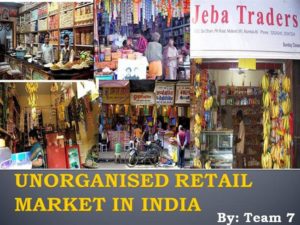
Small store (kirana) retailing has been one of the easiest ways to generate self employment, as it requires limited investment in land, capital and labour.
The reasons for unorganized retail sector domination in India:
– In smaller towns and urban areas, there are many families who are traditionally using these kirana shops/ ‘mom and pop’ stores offering a wide range of merchandise mix. Generally these kirana shops are the family business of these small retailers which they are running for more than one generation.
– These kiran shops are having their own efficient management system and with this they are efficiently fulfilling the needs of the customer. This is one of the good reasons why the customer doesn’t want to change their old loyal kirana shop.
– A large number of working class in India is working as daily wage basis, at the end of the day when they get their wage, they come to this small retail shop to purchase wheat flour, rice etc for their supper. For them this the only place to have those food items because purchase quantity is so small that no big retail store would entertain this.
– Similarly there is another consumer class who are the seasonal worker. During their unemployment period they use to purchase from this kirana store in credit and when they get their salary they clear their dues. Now this type of credit facility is not available in corporate retail store, so this kirana stores are the only place for them to fulfill their needs.
– Another reason might be the proximity of the store. It is the convenience store for the customer. In every corner the street an
unorganized retail shop can be found that is hardly a walking distance from
the customer’s house. Many times customers prefer to shop from the nearby kirana shop rather than to drive a long distance organized retail stores.
– This unorganized stores are having n number of options to cut their costs. They incur little to no real-estate costs because they generally operate from their residences. Their labour cost is also low because the family members work in the store. Also they use cheap child labour at very low rates

